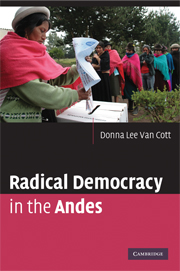Book contents
- Frontmatter
- Contents
- Acknowledgments
- List of Acronyms
- 1 Introduction: The Political and Cultural Origins of Democratic Institutional Innovation
- 2 The Legal and Political Context for Municipal Reform in Bolivia and Ecuador
- 3 Mayoral Leadership and Democratic Institutional Innovation
- 4 Political Parties, Civil Society, and Democratic Institutional Innovation
- 5 Institutional Innovation in Ecuador
- 6 Institutional Innovation in Bolivia
- 7 Conclusion: An Interaction Model of Democratic Institutional Innovation
- References
- Index
1 - Introduction: The Political and Cultural Origins of Democratic Institutional Innovation
Published online by Cambridge University Press: 05 September 2012
- Frontmatter
- Contents
- Acknowledgments
- List of Acronyms
- 1 Introduction: The Political and Cultural Origins of Democratic Institutional Innovation
- 2 The Legal and Political Context for Municipal Reform in Bolivia and Ecuador
- 3 Mayoral Leadership and Democratic Institutional Innovation
- 4 Political Parties, Civil Society, and Democratic Institutional Innovation
- 5 Institutional Innovation in Ecuador
- 6 Institutional Innovation in Bolivia
- 7 Conclusion: An Interaction Model of Democratic Institutional Innovation
- References
- Index
Summary
In the 1990s, as South America's party systems began to undergo serious crises, indigenous peoples formed electorally viable political parties for the first time. In Bolivia, Colombia, Ecuador, Guyana, and Venezuela, candidates emphasizing an ethnically indigenous identity and representing parties affiliated with indigenous social movement organizations gained control of local and intermediate governments, as well as a foothold in national legislatures. They became most successful in Bolivia and Ecuador, where today they dominate dozens of local governments and control significant blocs in Congress. In 2005 and 2002, respectively, indigenous parties elected the country's president.
It is no accident that the new indigenous parties emerged at a time when public confidence in parties had plummeted. The failure of parties to reduce poverty and inequality, to protect citizens from crime and violence, to promote economic development, and to protect human rights two decades after the end of military rule generated declines in public support for parties and for democracy itself (Drake and Hershberg 2006: 10; Hagopian 2005: 320; O'Donnell 2004: 46–51; UNDP 2004: 62). Latin American citizens view traditional political parties as corrupt, self-serving, incapable of addressing complex economic and social problems or protecting citizens rights and the rule of law, and unresponsive to increasing demands for action (Hagopian 2005: 321; Mainwaring and Hagopian 2005: 2; O'Donnell 2004). Voters are searching for representation alternatives that offer real solutions, as opposed to patriotic platitudes. Many are attracted to indigenous peoples' parties because they seem to provide an alternative.
- Type
- Chapter
- Information
- Radical Democracy in the Andes , pp. 1 - 33Publisher: Cambridge University PressPrint publication year: 2008



